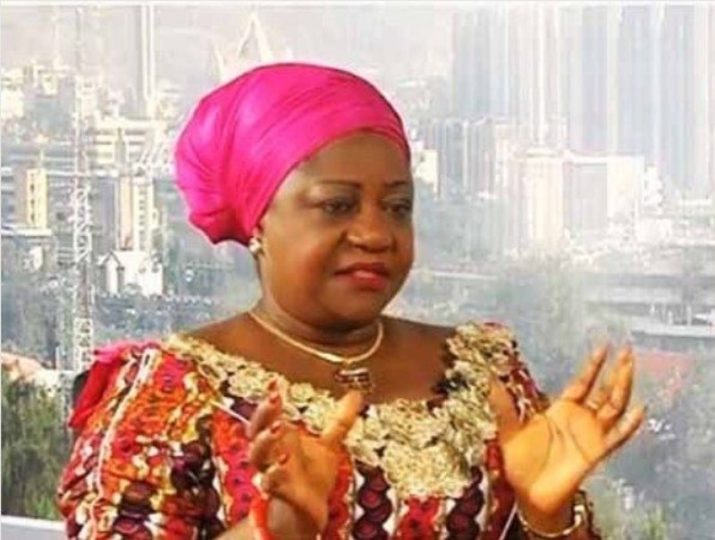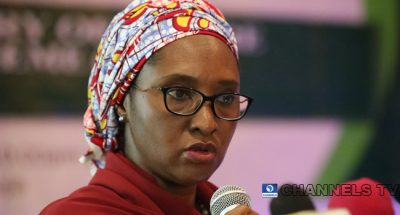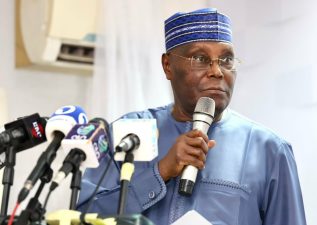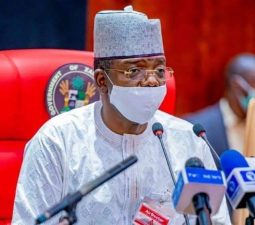*Says citizens asking a President on medication vacation to address them is disrespectful
Ms Lauretta Onochie, Special Assistant to President Muhammadu Buhari on Social Media, no doubt is a woman of independent mind working with a President that is all his life of same nature. This has made the workings of President Buhari, whose media aides are mostly independent minded people, to be smooth and succeeding to the extent that all of the media aides – from the Minister of Information and Culture, Alhaji Lai Mohammed, who is spokesman of the Federal Government, through the Special Adviser on Media and Publicity to the President, Mr. Femi Adesina, Senior Special Assistant to the President on Media and Publicity, Mallam Garba Shehu, to Ms Lauretta Onochie – were able to “stand out against mischief makers” while the King was away on medical vacation in London and all manners of rumours and fake news from that of death wishes to life support stories and all of that were being the drama acted daily in all branches of media in the country. Onochie, the thorn in the flesh of the opposition, is not just a teacher of language in a United Kingdom’s College but also a body language expert, known for her ability to say the truth even when it is against her interest and, just like Mr. Femi Adesina and Mallam Garba Shehu in the Media Office of the President, Lauretta Onochie has put on display invaluable capacity to stand to the face of people described as in many quarters as #CorruptionFightBack agents and that is one of the reasons she is a notable Amazon in the spokesmanship community of the Nigeria’s Presidential Palace. Precisely on November 1, 2017 in her office in Abuja, this eloquent Presidency’s official had a date with The DEFENDER during which she spoke about many things including why democracy that has worked well in western societies has not really been so in Nigeria. The Delta State-born Lauretta is unflinchingly an advocate of democracy of inclusiveness where traditional rulers are brought into play a role in the national politics without having concern for partisan politics. Excerpts:
Strictly, I would like to start from here: Democracy and presidential system have worked for America that is the western society where we copied them from. As a Nigerian in the Diapora, who I can only describe as being at home on sabbatical and is well exposed to the western or European society to the extent that you once contested in a council election in London, what would you say is the problem that democracy and presidential system don’t seem to work in Nigeria?
To answer the question you have just asked me about why it appears that democracy is not really working here like it is working for them in the western society where we copied it from, I would start with the fact that democracy is relative to the needs and culture of the people. I think it is absolutely not right to lift democracy the way it is practiced in America and bring it wholesale to Nigeria. Our ways of doing and viewing things are miles apart.
Now, there are many of us that have left Nigeria and have gone to sojourn in the Diaspora. Most of our people travelled to United Kingdom, America, the English Canada. But they are right in these countries and they still live in Nigeria. What that means is that they do not imbibe the culture of these people. They do not take on the good aspect of how these people do things. They still go to work late. They still talk so loudly. Our cultures are different and there are so many aspects of our culture that are beautiful; those ones we must keep. But there are also some that are good in the countries we have sojourned in; those ones we should take. So that when we take the good from these land and we take the good from our own background and we marry the two, then we have the benefit of two excellent cultures that make us to become superior in the way we look at things and in the way we tackle things.
I will give you an example, I know of our people living in the Diapora that would not touch watching powder if it is not Omo from Nigeria. They would not drink milk if it is not peak milk and it has to be the one made in Nigeria, there are shops near where I live in London that sell these things, and because of that they stand aloof seeing the white culture “not my business” but they live in that culture. Over there they don’t take part in community activities. They do not relate with other people’s culture and so the other people’s culture do not rub off on these people.
In the College where I used to lecture, I got so integrated into them and I was the only black person, not just woman, black person in my department. And each time we had a gathering, I would cook Jollof rice and I would not add plenty of pepper and I would make Moi-Moi, those things I know they can eat and I would take to them. The first time I brought it, many of them had never seen rice cooked that way but they ate it and they loved it absolutely. From that point on, each time we had an event, everyone would be asking me, “Are we going to have Jollof Rice, that Nigerian yellow rice?” I said, “It is not yellow rice. It is Jollof Rice.”
You know, I became a part of them. So, while they were learning mine, I was also learning theirs. And I also learned to be more tolerant, more accommodating more of standing up for other people rather than myself because, that is how they are over there. And I married that to the respect we show our elders, the way we have communities, I don’t know whether we still have such communities, where we used to support one another. I remember when I was little and when somebody was not well, the community would not let his farm be overgrown by weeds. Everyone would gather, go to his farm and clear it. When you put all of that together, it makes you a better person.
It has been my position. When I hear that a King or an Oba has been dethroned, I feel sad. A King or an Oba can abdicate that “I don’t want to be King any more”. That is his choice. But to dethrone the person is to spit on our traditional institution. And we must protect our traditional institution because our tradition and culture are what we have to pass on to our children. We have our ways of doing things; we have our ways of getting married, naming babies and we have a way of supporting the poor, the sick amongst us. These are things that communities can continue to do if their traditional rulers are empowered.
But having said that, our culture, I would say is based on what I would call idolization of the elderly because it is more than just respect. We idoloise our elderly so that if you were to come to the community, you couldn’t go directly to the youths or to the women to do something with them. You had to go through the elders; the Obis or the traditional rulers. So, because we have that and the Americans don’t have that; there you can go directly to a community and do what you want to do.
That means, when we lifted the American democracy, there had to be a way of domesticating it to our culture so that our traditional rulers are also involved. What we have done is that we have subjected our traditional rulers to the dictates of Local Government Councils and if a monarch says “I’m not going to do this, I’m going to do this and I am supporting this person”, he is threatened with removal, bringing us to the desecration of our traditional institutions.
When we begin to desecrate our tradition, our culture, then, what happens is that many of the things we do will go either into extinction or it will no longer serve us properly and it will no longer serve us the way it was meant to serve us. And this is correctly so because, if you go around now you will see that, apart from the foremost traditional rulers, go to the villages and see that the traditional rulers are the ones who are the closest to the people and they are the ones who have been cornered by the governors through the Local Government Councils and so, you will see that they have no say anymore. Many of them have become beggars. If the governors give them a little bit of this and that, when things are going wrong in their communities, they just look the other way.
We could have married our traditional institutions into our politics. That would have given us a different brand of democracy because we have our own brand where you have the traditional ruler and his chiefs and then you have the women, the youths. We have the hierarchy and we have it all marked out. But today, everything has changed and not even for any better and I weep. And I weep because I am very cultural person, I love African culture, I love Nigerian cultures, I love my Anioma culture. But the way we have treated and have kept our traditional rulers except those who are very educated and cannot be oppressed like the Sultan of Sokoto, the Emir of Kano, the news Ooni of Ife; those monarchs you can’t put them under because they are independent.
So, we need to find a way to bring into our politics because they are the closest people to the grassroots. If the traditional rulers were all part of our politics, if they inculcated into what we do, not to join political parties, if they were given a role to play in our democracy, then, they are the ones that will report whether the constituency projects that were meant for our people have been done or not and they will say it without fear of favour or threat knowing that the law protects them that they will not be removed. They can play a very good role and be the eyes of the government at the grassroots.
Some of these traditional rulers particularly Igwe Alex Nwokedi of Achalla, Anambra State and even the Olowu of Owu, Abeokuta, Ogun State have made calls traditional rulers to be given role to play in state affairs….?
(Cuts in) Have they?
Yes they have. Are you saying this now in giving a facelift to their demand?
It has been my position. When I hear that a King or an Oba has been dethroned, I feel sad.
Meaning that a King cannot be dethroned?
A King or an Oba can abdicate that “I don’t want to be King any more”. That is his choice. But to dethrone the person is to spit on our traditional institution. And we must protect our traditional institution because our tradition and culture are what we have to pass on to our children. We have our ways of doing things; we have our ways of getting married, naming babies and we have a way of supporting the poor, the sick amongst us. These are things that communities can continue to do if their traditional rulers are empowered.
The National Assembly should find a way to bring them in so that they can play the role that God has given them to play to our nation. That is what will make the difference the difference in our democracy. We have seen how much we are struggling trying to copy exactly what is in the American democratic patterns.
But a few months ago, the when President himself was on medical vacation, and because it has never happened that a President would hand over power to his deputy, this government has been handing over power to the Vice President who now became our Acting President. And when I came out to say that technically he is no longer our President, people attacked me in this nation but I am happy now that everyone is beginning to understand what I was trying to say.
I have always said it that, “This power, I give it to you, I don’t have anything anymore.” Full powers were transmitted to the Vice President to become the Acting President. Consequently, every decision taken in the nation, anything that happened at that time was the responsibility of the Acting President. The President himself wrote to the National Assembly and that power was taken and vested on the Vice President. And when he returned, he went back there and they took the power from the Vice President and gave it back to him. That is what it was and it is as simple as that.
So, when people were calling on him, “Come out and speak to us. You must address Nigerians. You must tell us what you are suffering from. Tell us what brand of paracetamol you take.” That was disrespectful. They have no right to do that and I still stand on it.
*Watch out for Part II of the Lauretta Onochie interview.




